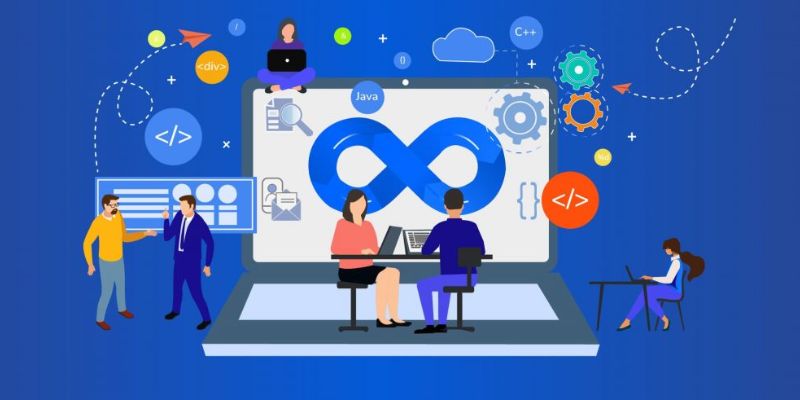DevOps is a way of working that brings development and operations teams together to build, test, and release software faster and more smoothly. It focuses on communication, teamwork, and automation. By breaking down the walls between teams, DevOps helps businesses deliver better results more quickly and with fewer mistakes. This approach has grown in popularity because it not only improves the technical process but also creates a more connected and productive work environment. Many professionals are now enhancing their skills through a DevOps Course in Coimbatore to stay ahead in this collaborative field.
Breaking Down Silos Between Teams
One of the biggest changes DevOps brings is removing the barriers between development and operations teams. In many organizations, these teams used to work separately, often leading to delays, misunderstandings, and blame. DevOps encourages both sides to work together from the beginning of a project. This shared responsibility helps avoid miscommunication and builds a sense of unity. When everyone understands the goals and challenges, it becomes easier to solve problems and achieve success as a team.
Encouraging Continuous Communication
DevOps promotes regular and open communication between all team members. Whether it’s daily stand-up meetings, feedback sessions, or online chats, communication becomes a key part of the process. This allows teams to share updates, identify issues, and make decisions quickly. DevOps Knowledge for Full Stack Developers plays a key role in this collaboration, as it helps bridge gaps between development and operations. Clear and consistent communication not only keeps projects moving forward but also helps team members feel heard and valued, which improves morale and trust.
Using Automation to Reduce Manual Work
Automation is a major part of DevOps and plays a big role in improving collaboration. By automating repetitive tasks like testing, deployment, and monitoring, teams can save time and reduce errors. This allows developers and operations staff to focus on solving real problems and improving the product. When automation tools handle routine jobs, it frees up time for teams to work together on more important tasks that require human thinking and creativity. Learning about automation tools and techniques is a vital part of a DevOps Training in Madurai.
Creating Shared Goals and Responsibilities
In a DevOps culture, success is measured by the team’s overall performance, not just individual achievements. Everyone is responsible for delivering high-quality software that works well and satisfies users. This shift from “my job” to “our job” creates a sense of ownership and encourages people to help each other. Developers are more aware of how their code affects operations, and operations teams are more involved in early planning. This shared vision brings greater focus and teamwork.
Faster Feedback and Continuous Improvement
DevOps enables teams to get feedback quickly through continuous integration and delivery practices. When updates are made often and tested automatically, teams can learn what works and what doesn’t right away. This fast feedback helps catch problems early and encourages a mindset of learning and improvement. When everyone works together to resolve issues and enhance the product, it fosters a stronger sense of partnership and shared purpose. A DevOps Training in Pondicherry provides practical training on how to set up and manage such continuous processes.
Building a Culture of Trust and Respect
Collaboration in DevOps is not just about tools and processes-it’s also about people. DevOps encourages a culture where team members respect each other’s roles, ideas, and efforts. Mistakes are seen as learning opportunities, not reasons to blame. When people feel safe to speak up, share ideas, and take risks, they are more likely to contribute fully. This kind of positive environment makes the whole team stronger and more effective.
Better Visibility and Transparency
With DevOps practices in place, everyone in the team has access to the same information, such as code changes, system performance, or customer feedback. This transparency helps avoid confusion and allows for smarter decisions. When all team members can see what’s happening in real-time, they can support each other better and act quickly when something needs attention. Visibility ensures that no one is left in the dark and that collaboration stays strong throughout the project.
Adapting to Changes More Easily
DevOps teams are better prepared to handle changes, whether it’s a customer request, a technical challenge, or a shift in priorities. Since the process is flexible and the team is closely connected, changes can be made quickly without causing delays or confusion. This ability to adapt keeps projects on track and helps teams respond to user needs effectively. Being flexible and responsive is a key part of successful collaboration in a DevOps environment.
DevOps brings development and operations teams together, creating a work culture that values communication, teamwork, and shared goals. By using automation, promoting transparency, and encouraging regular feedback, DevOps helps teams work more closely and efficiently. It removes traditional barriers and builds trust among members, allowing them to create better software with fewer problems. When teams collaborate well, they not only achieve better results but also enjoy the process. DevOps is not just a technical change-it’s a powerful shift in how teams work and grow together. For those eager to master this transformation, a DevOps Training in Tirupur offers the perfect learning path.
Also Check:
What is the Role of AWS in Enhancing CI/CD Processes in DevOps?

